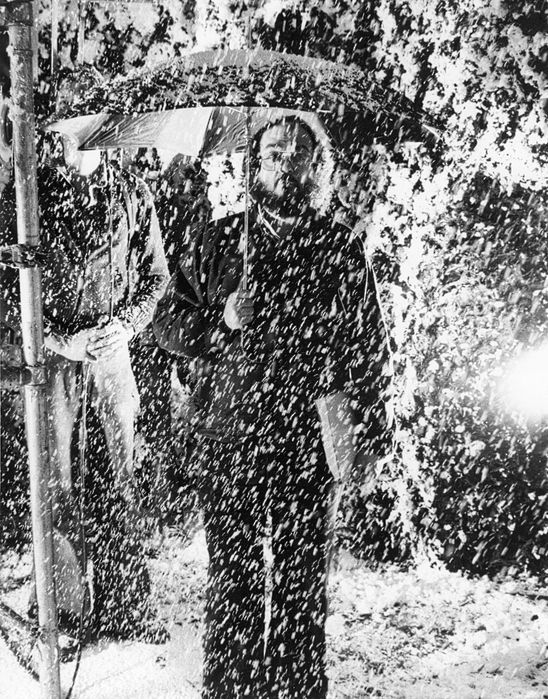HILL’s ‘TOMMY’ SQUEEZES OUT NOTES NOT EVEN PETE TOWNSEND KNOWS ARE THERE; BTF PLAY RUNS THROUGH JULY 16 AT COLONIAL
By DAN VALENTI
PLANET VALENTI Arts
(PITTSFIELD, Mass. TUESDAY July 12, 2011) — With director Eric Hill at the controls, you know there will be a whirlwind of swirling action and not one wasted move. Hill could direct The Phone Book, and the endless lines of “Smiths” would be doing the mambo with 1-800 numbers and help lines for lawyers.
Give Hill The Who’s Tommy and you have the equivalent of Ted Williams taking a swing in a T-ball game (only this time its pinball). The Who’s classic songs make it sound that easy, to the point where you wonder if Hill was frustrated at taking on this piece of ear candy that’s guaranteed to bring easy applause. Tommy, the play, doesn’t ask the audience already in love with the songs for much discrimination or discernment.
Forget about Plot; the Songs Drive Tommy
For her first main stage production at the Colonial since the Berkshire Theatre Festival merger, BTF producing director Kate McGuire made a move similar to Julie Boyd, who selected Guys & Dolls to open the season at Barrington Stage. Both chose “safety” over “stimulation.” Neither play challenges the audience. Both provide pure fun. Of course, Tommy — with its plot lines of rejection, isolation, pedophilia, the fleeting nature of fame, and the like — pretends to get at something more serious. It doesn’t.
Forget about the wafer-thin plot line; the songs drive Tommy.
Intellectually, the audience doesn’t have to digest but a lot to chew in the musical taffy. Pete Townsend’s sketchy ruminations on the perils of stardom provide hints of a decent story but not enough ribcage for red meat. Townsend’s music, however, distracts the audience into such a rousing state of sing-along that no one will care — perfect for the main stage opener.
Tommy: Album First, ‘Opera’ Second
Tommy will always first and foremost be a rock album: seminal, ground breaking, and — like the Beatles’ Sgt. Pepper — recorded with such quality to guarantee a long shelf life. The album has sold more than 20 million copies since its release in 1969, though far fewer people have actually seen Tommy in its relatively new life as a play. An early version was produced in 1971 in Seattle, but it wasn’t until 1993, 24 years after the album, that the Pete Townsend-Des McAnuff collaboration debuted. The Townsend-McAnuff is considered the “authorized” adaptation, and that’s the one now on stage at the Colonial Theatre in Pittsfield, Mass.
Tommy’s six-piece band under the direction of Randy Redd does justice to The Who’s score. Their instrumentals are serviceable, played as accompaniment and not meant to star or upstage. The band seems selected on the basis of not overshadowing what happens on stage. They are workmen delivering a pedestrian version of the music, no less and no more. The strongest member of the band is the guitarist, as it must be, given that Townsend wrote most of the numbers using that instrument. The weakest member, the drummer, is no Keith Moon. He’s barely Dave Clark of the 5. He keeps the beat but uses little imagination and in spots sound as if he needed at least another week of rehearsal.
Deaf, Dumb, and Blind Kid Sure Plans a Mean …
Using the album’s songs, Tommy tells the story of little Tommy Walker (Randy Harrison), who witnesses his father, just back from the war after being presumed killed, shoot to death his wife’s lover. Tommy’s parents tell him he didn’t see or hear anything and not to say word about the shooting. The lad becomes psychosomatically deaf, dumb, and blind. Tommy grows into a young man, his one talent being a savant-like ability to play pinball. He learns to Bally up, so to speak. Tommy becomes a pop phenomenon, adored by the masses only to be soon rejected by them. The crowd doesn’t like Tommy’s message to them: Being “normal” is the gift he craves, achieves, and preaches.
Various remedies are tried to bring Tommy out of his self-imposed isolation. The Acid Queen (Angela Robinson) gives Tommy LSD and sex. That doesn’t work. Various doctors try different pseudo-scientific treatments, including one involving a wicked, retro-1950s gold space-helmet-cum-football-helmet with lights and wires attached to a vintage cathode ray tube hooked to a manual typewriter. Nothing — not even Flash Gordon’s bar mitzvah present — can cure the boy.
The cure finally comes when Tommy’s mother (Jenny Powers), in frustration, smashes the mirror into which Tommy obsessively stares. The lad comes alive, and the rest is stardom and the fall from same into the blessed state of “normal.”
James Barry portrays Capt. Walker, Tommy’s father. This is another nice bit of casting. Barry’s dark, swarthy features give him the gravitas of an RAF captain, and he wears the uniform well.
As for the Singing: Powers Shows the Most Power
As for the singing, Powers seems strongest and the most self-assured of the three leads. She sings with an operatic force, the tonality giving the lyrics their full-throated meaning. Barry matches Powers’ well, with a mid-tenor that limbos just under baritone bravado. Harrison, a dynamic actor with tremendous stage presence, delivers a tinny singing Tommy whose thin, reedy vocalization is a tad too high in pitch. Harrison’s acting covers up, though, more than enough.
Harrison has the rock star’s lithe, shaggy blonde bon homme — like Gregory Hines and tap: “bone ta do it.” Harrison’s outfits work well with the character. As deaf, dumb, and blind Tommy, Harrison appears all in white, suggesting his innocence. After his cure, tinsely stardom brings with it the requisite silver sparkles and Elvis fringe.
Robinson sings the Acid Queen almost as Gospel. She shows phenomenal range that, however, borders on the unkempt. It’s one thing to soar, but G-force accelerations of voice must follow with descending as fast, and the effect is that Robinson’s song “wanders” too much. She crosses the fine line between soul and screeching. “Artistry” can wander as far as it wishes, but “art” needs constraint. It dies from too much freedom, and it does with Robinson. This could be a case of the musical director Gerry McIntyre and director Hill not being on the same G clef.
Hill’s Chorus Rocks and then Some
Hill puts together a brilliant, lively, and engaging chorus and ensemble: Rebecca Leigh, Christopher Gurr, Jacklyn Miller, Hannah Shankman, Christopher-Michael Vecchia, Zi Alikhan, Rory Donovan, Aaron Barcelo, Chris Chianesi, Brett Dameron, Jordan Barbour, and Ben Rosenblatt. They dance and sing with zest and energy, as if they are playing it each time for the first time. It’s here where Eric Hill shows his masterful touch: with the movement.
Hill makes full use of the Colonial stage, with wings, aisles, and even one of the loge seats stage left in play. He brings people on and off the stage with the precision and timing of a marching band. No movements are wasted, and every gesture adds meaning. Hill works with motion with the fluidity of an artist in oils. He “paints” meaning into the manner in which the characters express themselves through their bodies. This rings truest in Tommy.
There are actually three Tommys: Harrison and the lad at two earlier ages. Every gesture Tommy makes must express something of his inner torment. Hill conveys this literal “body” of knowledge to the three Tommys.
The grand finale, where all is reconciled and the entire cast fills the stage and aisles in song, populates both the theater itself and the imaginations — the various and respective theaters of the mind — with a delightful frosting. In the end, Tommy is a piece of cake — angel food, light, airy, sweet, insubstantial, and satisfying. Not fit as a steady diet, but fun as a snack. Hill squeezes notes out of the batter of Tommy not even Townsend knows are there.
TOMMY plays at the COLONIAL THEATRE through July 16. For ticket information, visit www.berkshiretheatre.org or call 413-298-5576 or 413-997-4444.















A quality production indeed, would say this has been the best show, for me anyway. Ah yes, Pete T. would be proud indeed. Give it a ten!
Great review of an excellent show. Agreed with all the major points, even the criticisms. Planet you’re reviews are superb, “different.” Enjoy them much.
BROWNING
THE PLANET appreciates your comments. Glad that you enjoyed the show. … and the review!